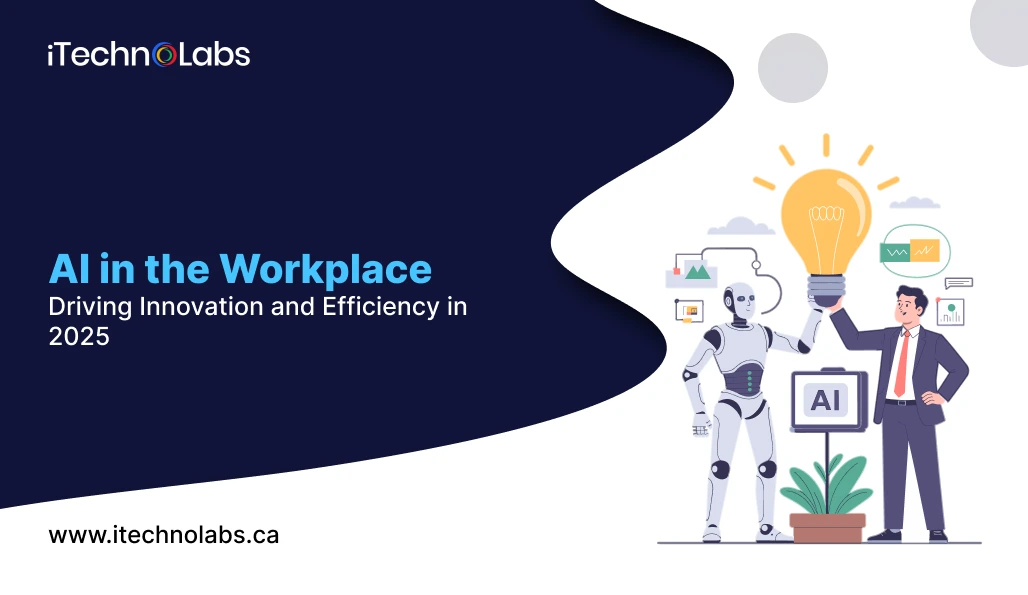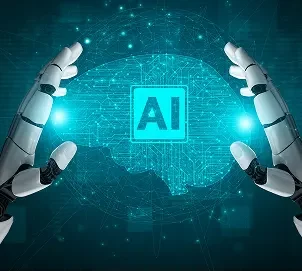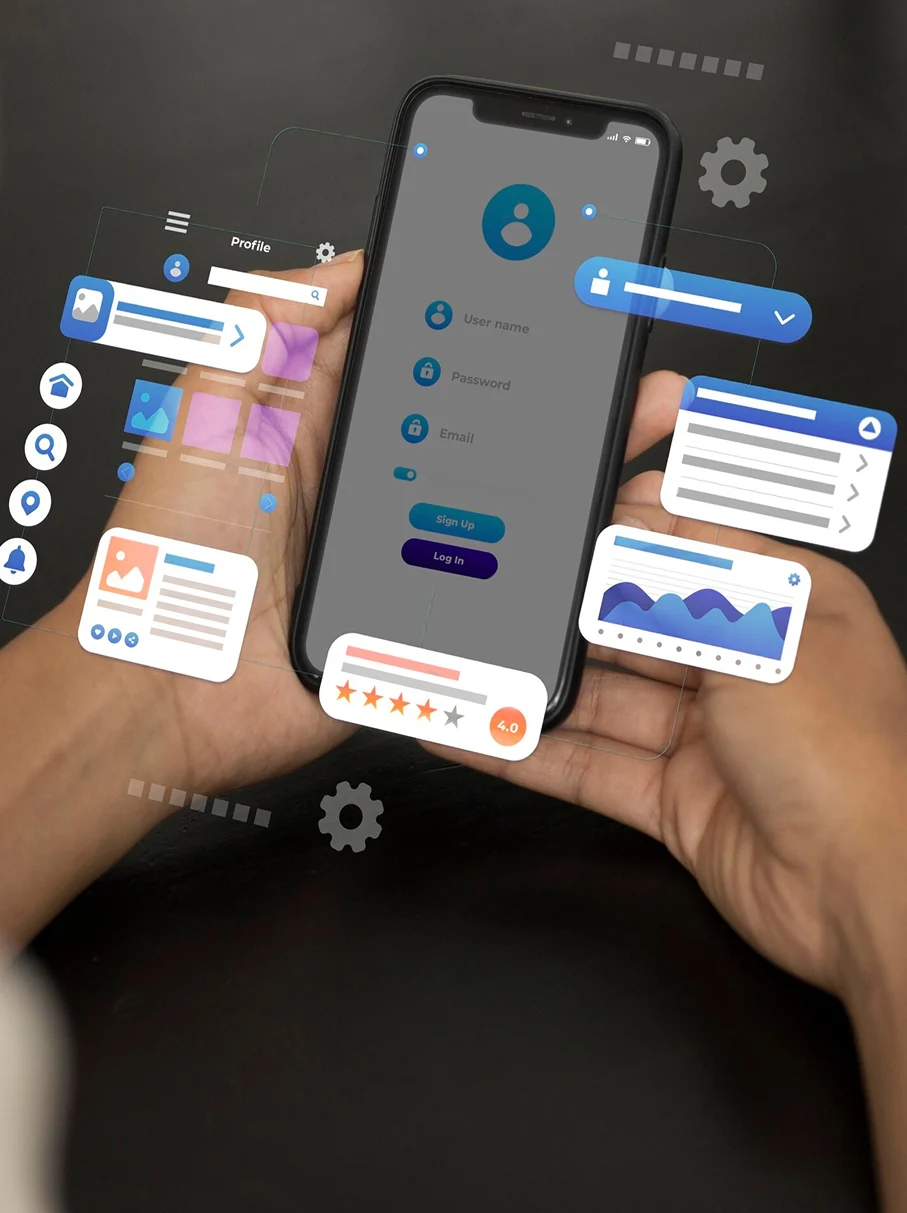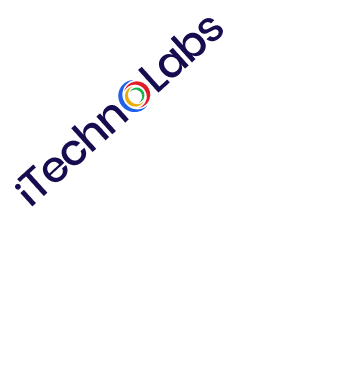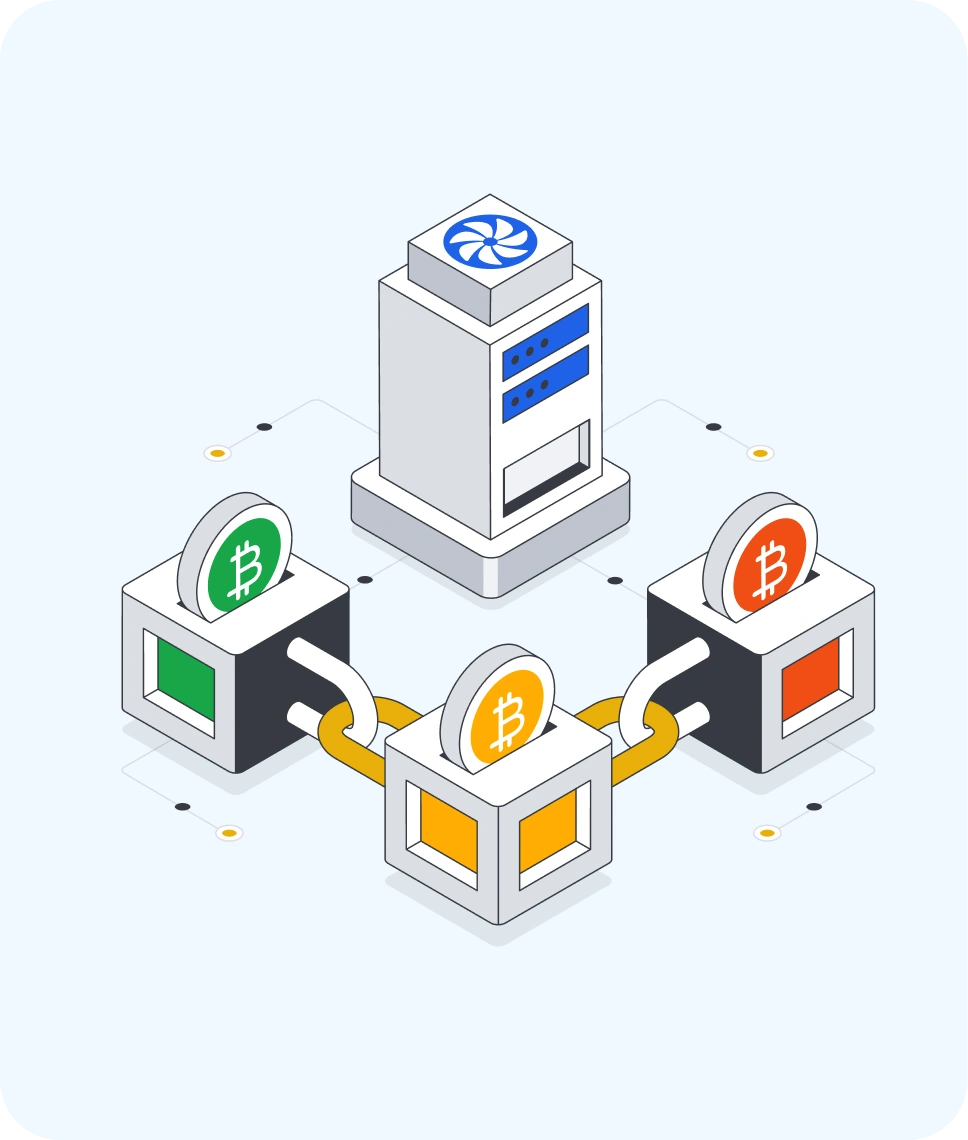AI will take your job. You have probably heard this statement many times on the internet. But the truth is that AI is not going to take your jobs at all. Rather, it’s going to increase your speed, improve your productivity, and make you free to do creative stuff. According to McKinsey’s 2025 report, 92% companies are going to invest massively in AI over the next 3 years. This clearly means that the new corporate world will be an amalgamation of AI tools and human workers. AI in the workplace is not an option, but a necessity.
With the help of AI, companies get free time to focus on creative projects. For example, Salesforce last year adopted Einstein AI, and they actually hired 3000 more employees as they got free to do value-driven work while AI handles routine tasks. Read this blog to know the advantages of AI in the workplace, its real-world applications, ethical issues, how to implement the same, and more.
Advantages of AI in the Workplace
Integrating AI into business brings a wide range of benefits, such as improved productivity, fewer errors, informed decision-making, and more. The following are the benefits of implementing AI in the workplace:
1. Reduced Errors and Cost
Humans can make mistakes, but AI can’t. Implementing artificial intelligence in the workplace can ensure zero errors. Fewer errors mean lower operational costs.
For example, artificial intelligence in banking and finance can help to detect malware and spam earlier. This prevents the banks and investment firms from financial loss.
2. Informed Decision-Making
In the business world, the decisions are based on data, not on guesses. But analyzing the data is not easy work. Here comes AI for your rescue. The super advanced artificial intelligence models can analyze the same data in minutes, which humans would take hours. AI tools can uncover trends and help business leaders make the right decisions.
3. Increased Revenue
Apart from cutting costs, AI in the workplace also helps to increase the revenue of the company. Careful analysis of the market allows the development team to create a product that will appeal to the masses. A lucrative product will compel people to buy it, and thus, AI helps to increase profits. According to the PwC June 2025 report, the industries using AI experienced 3 times more growth in revenue per employee.
4. Improved Employee Well-Being
Since AI in the workplace can automate repetitive tasks, the employees are free to do some other. They can indulge in activities like reasoning, collaboration, planning, and creative projects.
This works as a reward factor and motivates them to do more, as they won’t be doing the mundane tasks. The Microsoft 2024 Work Trend Index Annual Report says that employees are eager to become AI-literate and are not waiting for companies to teach them.
Real World Applications of AI in the Workplace
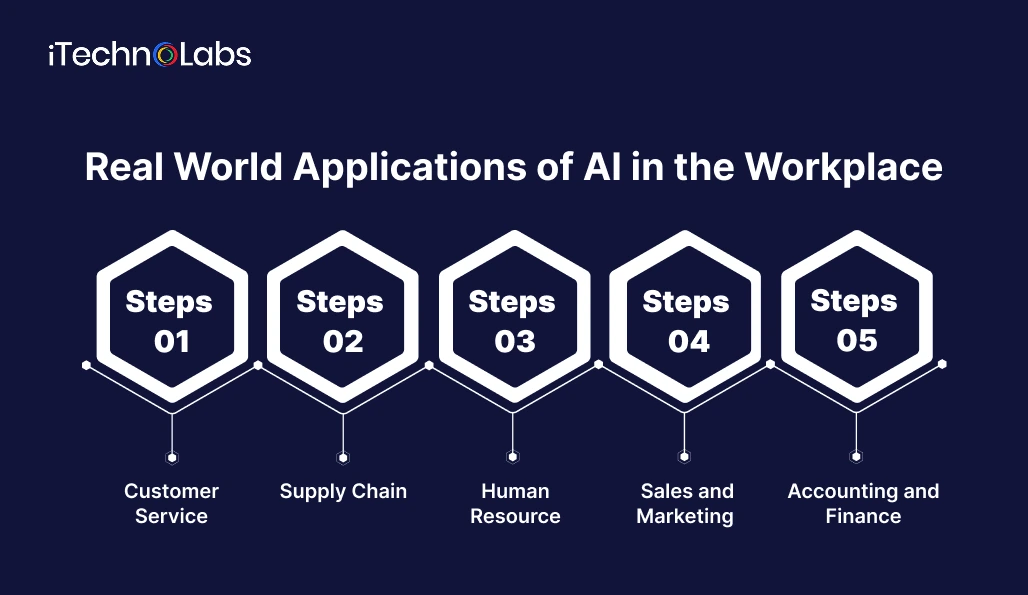
The use of AI is not limited to a particular sector but rather spreads across multiple industries globally. The following are the real-world applications of AI in different sectors:
1. Customer Service
Artificial intelligence in the workplace helps to enhance customer service. AI can analyze the history of users and instantly identify the issues they are facing. With this advanced capability, AI agents can immediately provide them with the solution or redirect them to human agents.
2. Supply Chain
AI in the workplace does wonders in logistics and supply chains. It tracks the shipment and can tell if it has reached the customer or not. It also helps to prevent overstocking and understocking. Apart from this, artificial intelligence models can also predict future demand based on historical trends.
3. Human Resource
Artificial intelligence tools can quickly screen the resume and shortlist the best candidates matching the requirements of the role. Many online AI tools can even conduct interviews with candidates. Unlike humans, it chooses the right talent based on skills and experience, without any partiality.
4. Sales and Marketing
Artificial intelligence in the workplace also helps the sales and marketing departments to do better. It can analyze the past buying patterns of customers and can predict the next time when the person will come to shop.
Moreover, it can also find out the channels through which people buy products, whether it’s Google ads, social media, or YouTube. This helps the marketing department to run the ads according to the platform at the right time and gain new customers.
5. Accounting and Finance
For financial firms like banks and insurance companies, artificial intelligence works like a Jinn. AI helps in crucial tasks such as risk assessment and fraud detection. This helps to prevent huge financial losses.
In accounting, AI tools automate invoice processing and reconciliation. This makes accounting professionals free to invest time in financial planning.
Ethical Issues in AI Automation
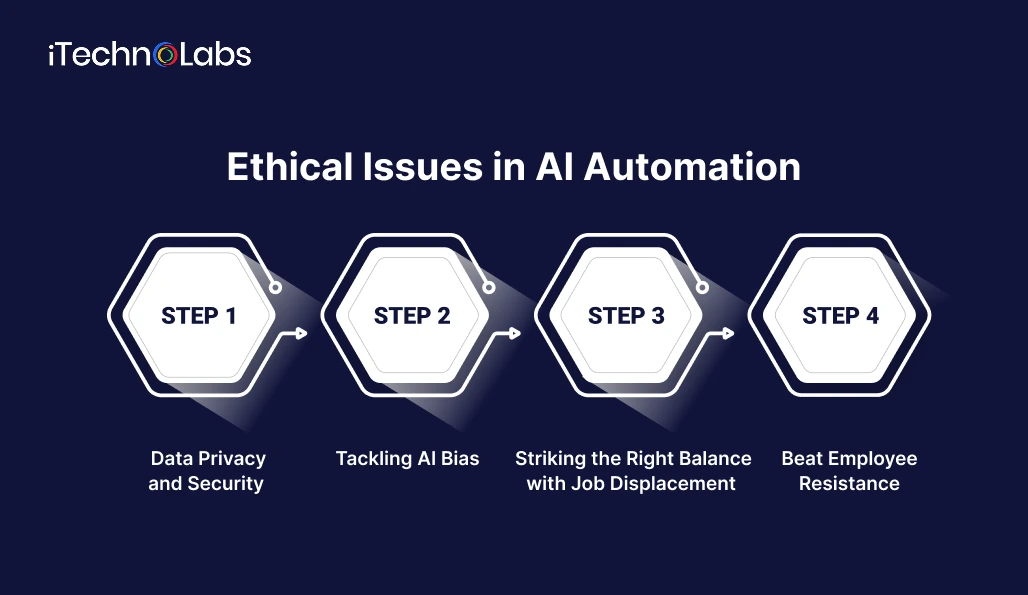
Just like any other technology, AI also comes with its own set of challenges. One of the biggest issues in AI in the workplace is ethics. Let’s understand that:
1. Data Privacy and Security
Artificial intelligence models handle huge amounts of data of employees and sensitive business information. These systems can become the target of cyber criminals, resulting in heavy financial losses.
The solutions for this are:
- Use advanced encryption protocols.
- Comply with data regulations such as GDPR and CCPA.
- Implement policies for transparent data usage.
- Conduct consistent security audits.
2. Tackling AI Bias
AI in the workplace is completely dependent on the data they are provided with. If this data is biased, the results will be unfair.
The solutions are
- Use a wide range of data sets.
- Consistently monitor AI results for discriminatory patterns.
- Train your teams to identify and eliminate bias.
3. Striking the Right Balance with Job Displacement
Many people think that AI will replace people. While it’s true that many people will lose their jobs to AI, it’s also a fact that AI will lead to the emergence of many new jobs that require creativity, critical thinking, and emotional intelligence.
The solutions are
- Conduct upsilling and reskilling programs.
- Make your employees AI-ready.
- Position AI as a partner in work, not a competitor.
- Create career evolution pathways.
4. Beat Employee Resistance
The employees might think that AI in the workplace is coming for their jobs. But this is not true. AI will help them do the job faster, smarter, and an efficiently.
The solutions are
- Organize comprehensive training programs.
- Highlight the benefits of automation of mundane tasks.
- Include employees in feedback processes.
Also, read: How Much Does It Cost to Train an AI Model?
How to implement AI in the workplace?
To implement AI in the workplace, there are multiple things you need to do. Firstly, go small, then gradually adopt AI at a large scale. Next, you need to set clear goals and teach your employees AI literacy. After that, you need to ensure that AI is smoothly integrated into your existing systems. Then you have to measure the performance, and you are all set. Read the following pointers to know how to implement AI in your business:
1. Start Small Then Go Big
You might be too excited to use AI in every business process at once. However, the ideal way is to find one problem that is most irritating for your employees, solve it, and then move forward.
Start slowly, and once you know that AI is solving one of your business problems perfectly, you can slowly start using it for other problems as well.
2. Frame Clear Goals
Define what exactly you want to achieve with AI. Do you want to improve the productivity of employees, or do you want to save time on a particular task?
If possible, define goals in numbers. For example, you want to reduce the report generation time from 4 hours to 1 hour. This will make everybody clear what they have to work toward.
3. Teach AI Literacy
Implementing AI in the workplace won’t make any sense if your employees can’t use it. Therefore, you need to make sure that you are conducting programs in which your employees will learn how to use AI. It’s important to make them understand that AI will make their job easier.
4. Integrate AI Seamlessly Into Existing System
The new AI tools must be compatible enough to seamlessly integrate into your existing workflows. If not, this will make employees upset, as they would have to learn a completely new technology from scratch. Therefore, it’s important to ensure that the AI can be easily implemented into your existing business processes.
5. Measure the Performance
So you have finally implemented AI in the workplace. Great. But this is not ending. You have just been halfway through. After implementing AI in your existing systems, you need to review it regularly and measure its performance. Ask your employees if they are facing any kind of issues and improve them for better productivity.
6. Collaborate with Professionals
The best way to implement the workplace is to partner with a reliable AI development company who have a team of professional AI engineers. Collaborating with an AI development company will help you integrate AI faster and without any mistakes.
Future of AI in the workplace
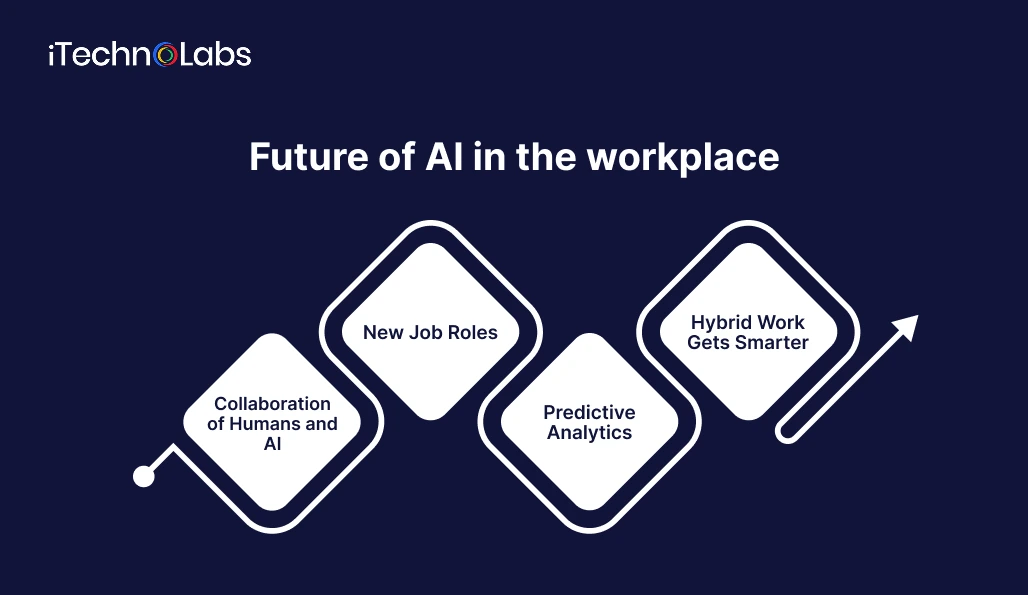
As AI continues to evolve, its role in the workplace is set to expand beyond automation. From enhancing decision-making to personalizing employee experiences, AI will redefine productivity, collaboration, and innovation. Organizations adopting these technologies early will gain a competitive edge, while employees will need to adapt to new skill demands.
1. Collaboration of Humans and AI
AI is not going to take over the work of humans completely. Rather, both are going to work together for better productivity and efficiency. And it’s already become a reality.
In healthcare, doctors diagnose patients while AI monitors them regularly. In finance, investment firms can focus on building client relationships, while AI will prevent scams and fraud.
2. New Job Roles
AI is indeed going to replace many job roles, but so is the fact that it will also lead to the birth of many new professions.
Some of the job roles that are going to emerge because of AI are AI ethics officer, human-AI interaction designer, and AI integration specialists. Only those people who will learn the skills machines can’t mimic will get ahead of others and remain employed.
3. Predictive Analytics
Artificial intelligence in the workplace will help companies detect problems even before they start to exist. For example, the AI models can detect when a machine needs maintenance, or if anybody is going to burn out by next week.
By analyzing huge volumes of data in minutes and consistently monitoring the environment, the AI helps companies to detect issues and take necessary steps.
4. Hybrid Work Gets Smarter
Remote workers often feel a lack of inclusion during the office meetings. Artificial intelligence in the workplace is soon going to solve this problem. AI models will be able to balance audio levels and ensure equal speaking time for every employee. This will bridge the gap between in-person and virtual experiences.
Important article: AI Model Collapse Prevention
Conclusion
Artificial intelligence is revolutionizing how companies work worldwide. AI in the workplace helps employees do more and better in less time. It helps to automate time-consuming tasks and allows human workers to focus on the things that AI can’t do.
The benefits of using artificial intelligence models in the workplace are enhanced productivity, fewer errors, reduced cost, more revenue, and increased employee well-being. Now you might want to jump to grab this opportunity, but there are many ethical issues that you have to resolve before implementing AI in the workplace.
This is a time-consuming and complex task. But don’t worry, as you can outsource this work to a reliable AI development company, which will take care of all the hassles. iTechnolabs has a team of more than 200 AI specialists with years of experience. We will help you implement AI in your workplace and gain a competitive edge. Visit the website now, discuss your requirements, and take complete advantage of this opportunity.
FAQs
1. How is AI used in the workplace?
Artificial intelligence in the workplace is used to automate repetitive tasks, which makes employees free to do creative projects and future planning.
2. What is the future of artificial intelligence in the workplace?
AI in the future will become smarter than ever. Some of the trends that we may look forward to are humans and AI working together, AI-based job roles, and predictive analytics.

